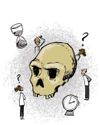Prøve GULL - Gratis
YOUR PRODUCTIVE BRAIN
BBC Science Focus
|March 2022
Increasing your productivity is easy. It's just a matter of making a few simple changes to your routine, or behaviour, or thinking, and your productivity will soar. At least, that's what countless online articles claim. The actual science tells a different story. Even a modest amount of research reveals that some of the most commonly touted claims about how to boost productivity fall apart in the face of the evidence. So, here are some of the most common myths around boosting productivity, along with a number of approaches that have a more robust scientific basis.

"WAKING UP AT 4AM WILL MAKE YOU MORE PRODUCTIVE!" (FALSE)
It's regularly claimed that you'll be more productive if you get up early. Very early. According to a 2016 Wall Street Journal article, the most successful (and therefore productive) people typically rise at 4am.
There's some logic to it. For instance, if you're awake while everyone else is still asleep, they won't distract you, so you'll be more productive.
However, there are many reasons why waking up at 4am could be actively unproductive. An important one stems from our own biology; sleep is crucial for our ability to function, and depriving yourself of it does more harm than good.
A typically healthy amount of sleep for adults is around seven to nine hours. Less than that quickly has negative health effects, compromising focus, mood, memory, stress tolerance, and more. Forcing yourself to wake at 4am means you're losing sleep, and will be less productive as a result.
Some people seem able to get away with it, being natural ‘early risers'. But the veneration of such people may be misplaced. A study by the National Sleep Foundation stated that “Individuals who habitually sleep outside the normal range may be exhibiting signs or symptoms of serious health problems or, if done volitionally, may be compromising their health and wellbeing”. Another study claims sleeping far fewer hours than average is more likely to be self-imposed than anything natural, and will incur a significant sleep debt, harming health.
Overall, while there may be some productive advantages to waking up in the early hours, these can easily be cancelled out by the consequences of lost sleep.

“JUST GET INTO YOUR "ZONE"(TRUE)
Denne historien er fra March 2022-utgaven av BBC Science Focus.
Abonner på Magzter GOLD for å få tilgang til tusenvis av kuraterte premiumhistorier og over 9000 magasiner og aviser.
Allerede abonnent? Logg på
FLERE HISTORIER FRA BBC Science Focus

BBC Science Focus
PASS THE PLASTIC
All of us are ingesting microplastics. Could dietary fibre help us get it out?
3 mins
November 2025

BBC Science Focus
Finally... An EV worthy of your bedroom wall
Ferrari's new Elettrica could be the car that gets dyed-in-the-wool petrolheads to long for an EV. It could also be the car that reshapes the entire EV landscape
4 mins
November 2025

BBC Science Focus
THE PUDU
Just when you thought Bambi couldn't get any cuter, meet the pudu, the world's smallest deer. Standing little taller than a domestic cat, what it lacks in size, it more than makes up for in allure. Doe-eyed, button-nosed, with little legs and perky ears, this diminutive South American mammal looks like it has stepped straight out of a Disney film.
2 mins
November 2025

BBC Science Focus
60-year mystery of the fossil skull that baffled scientists may finally be solved
The Petralona skull was discovered in Greece in 1960, yet its origin has perplexed experts – until now
2 mins
November 2025

BBC Science Focus
Only 1% of the world is eating a healthy and sustainable diet
A major report found healthier diets could transform the food system
3 mins
November 2025

BBC Science Focus
COLD AND FLU SEASON
Nobody enjoys being stuck in bed sneezing and coughing the days away. But there are steps you can take to increase your chances of avoiding these winter ailments
4 mins
November 2025

BBC Science Focus
There's another diabetes in town, here's how to recognise it
Misdiagnosis rates for this rare type of diabetes could be complicating treatment for patients
5 mins
November 2025

BBC Science Focus
THE QUEST TO FIND THE EDGE OF THE SOLAR SYSTEM
NASA's newly launched IMAP mission is set to tell us more about the boundary between our Solar System and interstellar space than ever before
7 mins
November 2025

BBC Science Focus
WHICH VAPE FLAVOUR IS WORSE FOR YOU?
If you're trying to quit smoking, you'll have probably heard talk that switching to e-cigarettes - or vapes - is a healthier option. One study by researchers at University College London estimated that in 2017 alone, over 50,000 people stopped smoking thanks to their use of e-cigarettes.
2 mins
November 2025

BBC Science Focus
WANTED: GUT BACTERIA DEAD OR ALIVE
There are millions of bacteria living in our guts. There are millions of dead bacteria there too. And scientists are learning just how much potential the dead ones have to improve our health
7 mins
November 2025
Translate
Change font size
